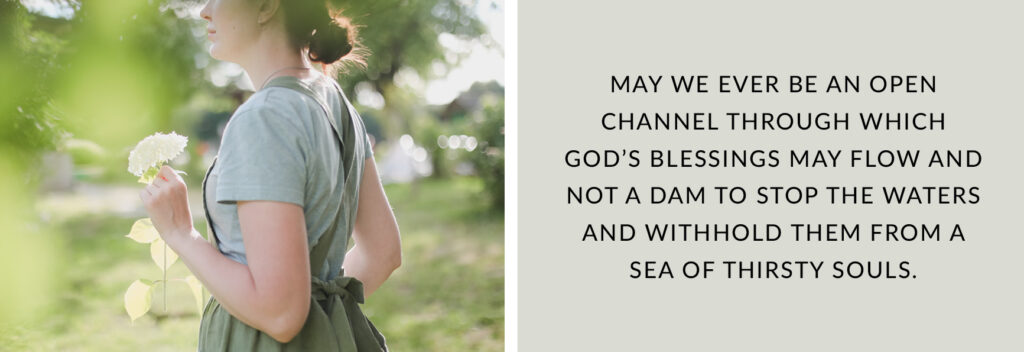Becoming a Conduit of God’s Love to Thirsty Souls
By Leslie Ludy

“I can’t do this!” I spoke adamantly, sitting on the bed next to my half-packed suitcase and feeling completely overwhelmed. I was scheduled to leave early the next morning to speak at a women’s conference in another state, and it was the last thing in the world I felt up to. Between the challenges of raising four young children and my never-ending mountain of ministry tasks, I wondered why I had ever said yes to going in the first place.
On top of everything, I had also agreed to bring my three-year-old adopted son so that he could connect with members of his birth family who lived in the area. But now the thought of traveling by myself across the country with a toddler in tow — and then immediately having to get on a stage to speak at a six-hour event — seemed more than I could handle.
The temptation to back out was incredibly strong. I felt that I had absolutely nothing to offer the women who would attend the conference, and I was convinced they would be better off not hearing from me at all.
I shared with Eric how I was feeling. As we prayed and talked together, I was reminded of a vital truth I was overlooking in my state of overwhelmedness — I can’t do this, but God can do it through me.
The story of Jesus feeding the multitude came to mind. The disciples found themselves in a similar predicament to the one I was facing: a complete inability to do what God had called them to do.
When Jesus told His disciples to provide food for more than 5,000 hungry people in the wilderness that day, the odds were totally against them. First of all, they were in a desert place — a dry, desolate, wilderness area where food was either scarce or nonexistent. Second, they did not have the money to feed the multitude. Philip pointed out that even if they did have a large sum of money to purchase food, it would still not be sufficient to feed such a crowd. (See John 6:7.) Third, it was late in the day, almost dark. Presumably, surrounding towns and villages would soon be shutting down for the night, so even if they were able to somehow scrape some money together, there would be nowhere to obtain food. Their only asset was a little boy’s lunch, hardly even worth mentioning in light of the overwhelming need.
Jesus had asked them to do the impossible. But He wasn’t asking them to look to their own resources in order to obey His request. It says in John 6:6 that, “…He Himself knew what He would do.” The disciples didn’t need to figure out how to provide bread for the crowd. They simply needed to get in step with the Bread of Life Himself.
This was the critical reminder I needed. The next day, by God’s grace, I was on stage speaking — and it turned out to be a powerful message that blessed many people. Even in my weakness and helplessness, He supplied everything I needed in order to get outside of myself and offer something of value to others.
Although that experience took place 11 years ago, it brought home a vital spiritual lesson I have never since forgotten. If I had only focused on my own inadequacy, I would have hindered His light from shining through me and missed the privilege of being a conduit of His love to those precious souls.

The Channel of Blessing Principle
Even though we are not all called to physically feed a hungry crowd (or speak at women’s conferences for that matter), each of us has been called to be a conduit of God’s love and hope to others, no matter our situation or season of life.
Just like feeding the multitude, this is truly an impossible calling. And many of us feel that we cannot possibly say yes to this calling because of our own weakness and inadequacy. Scriptures that challenge us to extend our hands to the poor, to reach out our hands to the needy, to lodge strangers, to relieve the afflicted, and to wash the feet of the saints often seem like ideals that we can never live up to realistically. (See Proverbs 31:20 and 1 Timothy 5:10.)
We are quick to forget that what God calls us to, He equips us for. And yet, He is ready and waiting to provide us with spiritual refreshment to offer others, if only we will allow Him. As Christ’s Body, we are meant to be carriers of His hope, light, and truth to a desperately needy world. But just like the disciples, we must look to Him to supply what we need in order to fulfill this call.
This truth was beautifully illustrated in the life of my great-grandmother Ida Calliham — a wife and mother of seven who lived on a farm in rural Texas during the Great Depression. She was a simple, hard-working country woman who was never educated beyond the eighth grade, but she had a mighty faith in a mighty God. She died when I was very young, but growing up I frequently heard about how she always made room at her table for weary travelers and about the amazing, outward-focused life she lived.
As my grandfather described it:
There were so many instances of helping others that it was an everyday occurrence. She was raising seven children and took care of us in every way a mother could. In the early days there was no electricity, no washing machine. We lived in the drought days — the Depression days — and she weathered all of that not only without complaint, but with joy. I remember her working around the house — washing dishes, sweeping the floor — and she whistled and sang all the time. You’d walk into the house and she would be singing a hymn, just emanating happiness.
In spite of taking care of us in those conditions, she also helped people in the community. Most babies were born at home, and she was a midwife to so many and particularly to one family with several kids where the father drank quite a bit. They were very poor farmers. He would come over and say, “Ms. Ida? It’s time again.” She would wrap up whatever she was doing and take off and deliver that baby.
There was a woman in our community who was ostracized because she was a former prostitute. One day she got very ill. They didn’t have money for a doctor or hospital, so she was confined at home. Her husband couldn’t quit work to take care of her. But my mother took care of her for two weeks. It didn’t matter who that woman was, she was sick and needed help, and my mother was there.
Another man had scarlet fever and had nobody to take care of him. With that disease you were supposed to put quarantine signs up and keep people out of the house. But my mother went to help him. She cleaned her face and hands with a disinfectant solution so she wouldn’t bring it back to her family and prayed to the Good Lord to take care of her. And it worked out that way.

This brief glimpse of her life immediately begs the question: How exactly was this simple woman able to live such a life of energetic joy and sacrificial love, while tirelessly serving her community, showing constant hospitality to strangers, and raising seven children during such a difficult time as the Depression?
She had no modern advice about setting boundaries, protecting “me time,” or establishing a daily self-care routine. She had no conferences, blogs, or women’s groups to help her with emotional processing, goal-setting, testing her personality, or personal introspection. And there was no social media or Netflix to offer a temporary escape from the hustle and bustle of daily life.
But she didn’t seem to need any of those things.
In many Christian circles today, a woman like Ida would likely be told that such a demanding and others-focused life would eventually lead to burn-out, emotional exhaustion, and blurry self-identity. But those ideas were not part of the equation in the mid-1900s, and my great-grandmother lived a joyfully poured-out life — never too busy to help someone in need.
Did she live in a constant state of stress and overwhelm? Quite the opposite. As my grandfather said, she emanated happiness.
What was her secret?
A number of years ago, I was given an article that she wrote in 1923 for her local newspaper in Conway, Texas (back when it was not unheard of for secular newspapers to print spiritual truth). The article describes her personal journey to becoming a channel of God’s blessing to others. It’s a simple message that was written in a different time, but I believe it offers rare and valuable insights for Christian women in today’s topsy-turvy world.
Let’s take a look.

What is a Channel of Blessing?
Written by Ida Calliham, 1923
As I sat in a large church, listening to the songs from the choir as they rang forth with such radiance, this is what we heard:
“Make me a channel of blessing today,
Make me a channel of blessing, I pray.”1
As these words fell upon my ears, the question came into my mind: What is a channel of blessing?
The definition of a “channel” is a medium of conveyance. Another definition is the bed of a stream. So I began to ask myself, “Am I a channel of blessing? And how can I be such? What must I do?”
The answer came when I remembered the words of Jesus spoken to the disciples in Matthew 14 when the multitude of 5,000 were fed. When the disciples said, “We have here only five loaves and two fish,” (Matt. 14:17) they thought that was too small to think of even troubling with. But Jesus said, “Bring to Me what you have, no matter how very small it may seem” (Matt. 14:18, paraphrased). He took the loaves and the fish, and looking up into Heaven, He blessed and broke the bread, then gave the loaves to His disciples, and the disciples to the multitude.
There we have a channel of blessing.
When the disciples obeyed the Lord and brought what they had — though so very little — and laid it at His feet, He blessed it and gave it back to them more than a hundredfold. Then the disciples were able to convert this blessing and feed the multitude until their hunger was satisfied, and they still had food to spare.
This story from Matthew 14 shows us what a channel of blessing is and how our life might be made a channel of blessing. When we lay our all at Jesus’ feet, He blesses it and gives it back to us — that we might pass the blessing on to our fellow brothers and sisters. Those around us are hungry for spiritual food, such as a smile, a kind word, a handclasp, or a hand to point them to Jesus.
If only we will let God have His way with us, our hearts will overflow with brotherly love and kindness one for another. That is what Jesus taught and is still teaching through His disciples. If we are to be a channel of blessing, we should not stop God’s blessings which fall on us but let them flow unhindered to others.
God calls us His co-workers. Are we working with Him or leaving it up to Him alone? The disciples helped Jesus to feed the multitude, or rather, Jesus helped the disciples to feed the multitude. And He will just as surely help us to feed hungry souls if we will give Him our life to bless that we may be a blessing. Then we can truly sing, “Bless me, Lord, and make me a blessing.” Or, “Make me a channel of blessing.”2
Let our prayers not always be, “Lord, bless us.” Or, “Send blessings upon us.” Rather, let us pray, “Bless me, Lord, and make me a blessing.” Then the blessings God has given us shall be a blessing both to our fellow man and to God.
Are you a channel which conveys the blessings of God to hungering, thirsting souls? Or are you just a sponge which absorbs all the blessings God bestows upon you and gives nothing in return? To serve God, we must love and serve our fellow man. May we ever be an open channel through which God’s blessings may flow and not a dam to stop the waters and withhold them from a sea of thirsty souls.
It was this principle of being an “open channel” that equipped my great-grandmother to tirelessly serve others year after year — never burning out, never losing hope, and never giving up. It is the same lesson God demonstrated in my own life those years ago when I felt completely inadequate for the task in front of me. And it is the secret to living the outward and selfless lives that each of us are called to live.

This article was originally published in Issue 38.
For more content, explore our article collection.